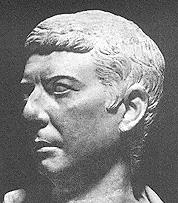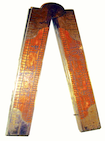Julius Caesar: Act 1, Scene 1
Enter FLAVIUS, MARULLUS, and certain Commoners over the stage.
over the stage: from opposite sides of the stage. >>>
FLAVIUS
1 Hence! home, you idle creatures get you home: 2 Is this a holiday? what! know you not, 3 Being mechanical, you ought not walk3. mechanical: of the class of skilled workers, such as carpenters and cobblers.
4 Upon a labouring day without the sign4. sign: emblem, such as the carpenter's ruler.
5 Of your profession? Speak, what trade art thou? First Commoner
6 Why, sir, a carpenter. MARULLUS
7 Where is thy leather apron and thy rule? 8 What dost thou with thy best apparel on? 9 You, sir, what trade are you? Second Commoner
10 Truly, sir, in respect of a fine workman, I am but, 10. in respect . . . workman: compared to a skillful workman.
11 as you would say, a cobbler. 11. cobbler: clumsy bungler. (But Second Commoner is making a joke; he really is a cobbler, a repairer of shoes.)
MARULLUS
12 But what trade art thou? answer me directly.12. directly: immediately and plainly.
Second Commoner
13 A trade, sir, that, I hope, I may use with a safe 14 conscience; which is, indeed, sir, a mender of bad soles. MARULLUS
15 What trade, thou knave? thou naughty knave, what trade? 15. naughty: good-for-nothing. (Marullus doesn't catch or doesn't like the soles/souls pun.)
Second Commoner
16 Nay, I beseech you, sir, be not out with me: yet,
16. out with me: angry with me.
17 if you be out, sir, I can mend you.17. be out: i.e., be coming out of your shoes. (Second Commoner is again punning.)
MARULLUS
18 What meanest thou by that? mend me, thou saucy fellow! Second Commoner
19 Why, sir, cobble you. FLAVIUS
20 Thou art a cobbler, art thou? Second Commoner
21 Truly, sir, all that I live by is with the awl: I
21. awl: a cobbler's tool, used to sew leather. >>>
22 meddle with no tradesman's matters, nor women's 23 matters, but withawl I am, indeed, sir, a surgeon 23. withawl: nevertheless. (With a pun on 'with awl'.)
24 to old shoes; when they are in great danger, I 25 recover them. As proper men as ever trod upon
25. recover: cure. (With a pun on re-cover, meaning 'cover again'.) proper: handsome, admired.
26 neat's leather have gone upon my handiwork.
26. neat's leather: cowhide.
FLAVIUS
27 But wherefore art not in thy shop today? 28 Why dost thou lead these men about the streets? Second Commoner
29 Truly, sir, to wear out their shoes, to get myself 30 into more work. But, indeed, sir, we make holiday, 31 to see Caesar and to rejoice in his triumph.
31. triumph: triumphal processions. >>>
MARULLUS
32 Wherefore rejoice? What conquest brings he home? 33 What tributaries follow him to Rome,33. tributaries: captives who will pay ransom (tribute) for their release.
34 To grace in captive bonds his chariot-wheels? 35 You blocks, you stones, you worse than senseless things! 36 O you hard hearts, you cruel men of Rome, 37 Knew you not Pompey? Many a time and oft
37. Pompey: former partner in power with Caesar. >>>
38 Have you climb'd up to walls and battlements, 39 To towers and windows, yea, to chimney-tops,
39. chimney-tops: Shakespeare's Rome looks like Shakespeare's London. The Romans had no chimneys.
40 Your infants in your arms, and there have sat 41 The livelong day, with patient expectation, 42 To see great Pompey pass the streets of Rome: 43 And when you saw his chariot but appear, 44 Have you not made an universal shout, 45 That Tiber trembled underneath her banks,45. Tiber:The great river that flows through Rome.
46 To hear the replication of your sounds
46. replication: echo.
47 Made in her concave shores? 48 And do you now put on your best attire? 49 And do you now cull out a holiday?49. cull out: choose.
50 And do you now strew flowers in his way50. his: Caesar's.
51 That comes in triumph over Pompey's blood?
51. Pompey's blood: Pompey's kin; i.e., Pompey's sons, who Caesar defeated in the Battle of Munda, March 45 BC.
52 Be gone! 53 Run to your houses, fall upon your knees, 54 Pray to the gods to intermit the plague
54. intermit: withhold.
55 That needs must light on this ingratitude.
54. light on: come down upon.
FLAVIUS
56 Go, go, good countrymen, and, for this fault, 57 Assemble all the poor men of your sort; 58 Draw them to Tiber banks, and weep your tears 59 Into the channel, till the lowest stream 60 Do kiss the most exalted shores of all.
60. the most exalted shores of all: the highest banks of the Tiber.
Exeunt all the Commoners.
61 See whether their basest metal be not moved;
61. See . . . moved: i.e., Now we see that their base natures have been moved to tears.
62 They vanish tongue-tied in their guiltiness. 63 Go you down that way towards the Capitol;
63. Capitol: i.e., the Capitoline hill. >>>
64 This way will I. Disrobe the images,
64. images: i.e., statues of Caesar.
65 If you do find them deck'd with ceremonies.
65. ceremonies: crowns and other royal regalia. (As a propaganda ploy, Caesar's supporters had set up statues of him in royal regalia.)
MARULLUS
66 May we do so? 67 You know it is the feast of Lupercal.
67. feast of Lupercal: an ancient feast of purification and fertility. >>>
FLAVIUS
68 It is no matter; let no images 69 Be hung with Caesar's trophies. I'll about,
69. Caesar's trophies: decorations put up in honor of Caesar.
70 And drive away the vulgar from the streets:
70. the vulgar: commoners.
71 So do you too, where you perceive them thick. 72 These growing feathers pluck'd from Caesar's wing 73 Will make him fly an ordinary pitch,
73. pitch: height. (A falcon's pitch is the high point in its flight; from its pitch the falcon swoops down on its prey.)
74 Who else would soar above the view of men 75 And keep us all in servile fearfulness. Exeunt.
